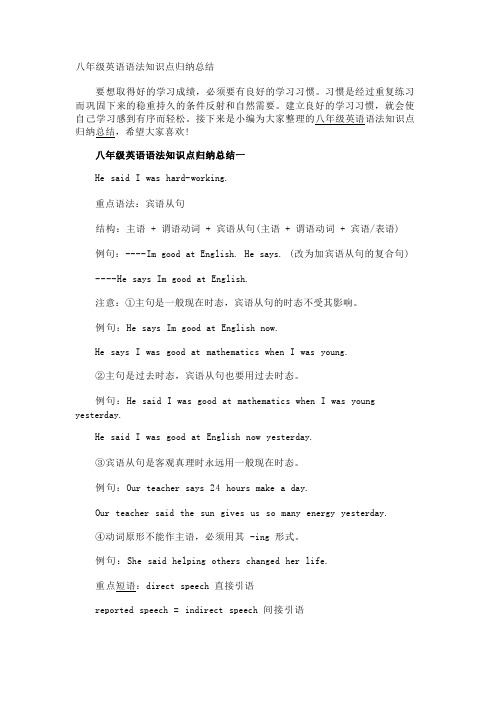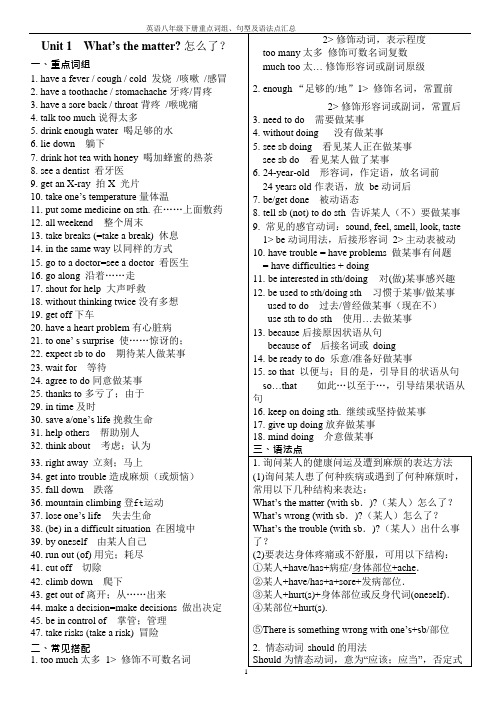八年级英语重点语法、考点、短语及句型
- 格式:docx
- 大小:19.13 KB
- 文档页数:11

初二英语知识点归纳一、基本语法知识:1. 时态:一般现在时、一般过去时、一般将来时、现在进行时、过去进行时、将来进行时、现在完成时、过去完成时、将来完成时等。
2. 句型:陈述句、疑问句、否定句、祈使句、感叹句、条件句等。
3. 名词:单数、复数、可数名词、不可数名词、所有格等。
4. 代词:人称代词、物主代词、指示代词、疑问代词、不定代词等。
5. 冠词:定冠词、不定冠词等。
6. 形容词:比较级、最高级、形容词前置修饰语等。
7. 副词:频度副词、程度副词、时间副词、地点副词、方式副词等。
8. 动词:不规则动词、动词的时态、动词的语态等。
9. 介词:常见介词、介词短语等。
10. 连词:并列连词、从属连词、转折连词等。
11. 非谓语动词:不定式、动名词、现在分词、过去分词等。
12. 从句:名词性从句(主语从句、宾语从句、表语从句、同位语从句)、定语从句、状语从句等。
二、词汇知识:1. 动词短语:动词+副词/介词、动词+名词等。
2. 常见短语、习语和固定搭配。
3. 同义词、反义词和近义词。
4. 常用的词根、前缀和后缀。
5. 一些常见的词汇拼写规则和变形规则。
6. 数字、日期、星期、时间、颜色、动物、食物、家庭成员、学科、国家和城市等。
三、阅读理解:1. 根据文章内容回答问题。
2. 根据文章中的信息进行推测、判断或总结。
3. 理解文章的主旨、目的、态度、观点等。
4. 根据文章的语境理解词义。
5. 了解不同类型的文体特征和写作方式。
四、写作能力:1. 书面表达:写信、写日记、写作文等。
2. 口头表达:简单介绍、自我介绍、描述事物等。
3. 语法运用:正确使用时态、人称、冠词、代词等。
4. 语言表达:丰富的词汇、恰当的句型、流畅的语言。
五、听力技能:1. 听懂并获取关键信息。
2. 根据对话或短文回答问题。
3. 听懂人物之间的对话和交流。
4. 培养对英语语音和语调的感觉。
六、口语交流:1. 学会问问题和回答问题。
2. 学会用英语进行简单的交流和沟通。

人教版八年级上册英语语法、短语和知识点总结归纳一、语法1. 一般现在时- 用法:表示经常性或惯性的动作或状态。
- 结构:主语 + 动词原形 (+ 其他成分)- 示例:I play soccer every weekend.2. 一般过去时- 用法:表示过去某个时间点或一段时间内发生的动作或存在的状态。
- 结构:主语 + 动词过去式 (+ 其他成分)- 示例:She watched a movie last night.3. 现在进行时- 用法:表示现在正在发生的动作。
- 结构:主语 + am/is/are + 动词-ing (+ 其他成分)- 示例:They are studying for the exam.4. 现在完成时- 用法:表示动作或状态发生在过去某个时间点,但与现在有关。
- 结构:主语 + have/has + 动词过去分词 (+ 其他成分)- 示例:I have finished my homework.5. 情态动词- 用法:表示能力、意愿、可能性等。
- 常见的情态动词有 can, could, may, might, must, should, ought to 等。
- 示例:He should go to bed early.二、短语1. as well as- 用法:表示两个事物同时存在或发生。
- 示例:She can speak English as well as Chinese.2. in order to- 用法:为了做某事。
- 示例:They woke up early in order to catch the train.3. by the way- 用法:用于引入一个新的话题或问题。
- 示例:By the way, have you seen the latest movie?三、知识点1. 直接引语和间接引语- 直接引语:用引号括起来的原话。
- 间接引语:将直接引语转述为陈述句或疑问句。

八年级英语语法知识点归纳总结要想取得好的学习成绩,必须要有良好的学习习惯。
习惯是经过重复练习而巩固下来的稳重持久的条件反射和自然需要。
建立良好的学习习惯,就会使自己学习感到有序而轻松。
接下来是小编为大家整理的八年级英语语法知识点归纳总结,希望大家喜欢!He said I was hard-working.重点语法:宾语从句结构:主语 + 谓语动词 + 宾语从句(主语 + 谓语动词 + 宾语/表语) 例句:----Im good at English. He says. (改为加宾语从句的复合句) ----He says Im good at English.注意:①主句是一般现在时态,宾语从句的时态不受其影响。
例句:He says Im good at English now.He says I was good at mathematics when I was young.②主句是过去时态,宾语从句也要用过去时态。
例句:He said I was good at mathematics when I was young yesterday.He said I was good at English now yesterday.③宾语从句是客观真理时永远用一般现在时态。
例句:Our teacher says 24 hours make a day.Our teacher said the sun gives us so many energy yesterday.④动词原形不能作主语,必须用其 -ing 形式。
例句:She said helping others changed her life.重点短语:direct speech 直接引语reported speech = indirect speech 间接引语first of all = at first 首先pass on 传递be supposed to do sth. 应该做某事be good at = do well in 在某方面做得好in good health 身体健康get over 克服open up 打开care for = take care of = look after 照料;照顾not any more = not any longer = no longer 不再have a cold 感冒end-of-year exam 年终考试get nervous 变得紧张forget to do sth. 忘记做某事(该事未做)forget doing sth. 忘记做某事(该事已做)its + adj. + [for sb.] + to do sth. 做某事[对某人来说](加形容词)context 上下文Reading Strategy(阅读方法)First read for meaning, not for detail. (首先理解文段的大致意思,不在于文段的细节部分。

13.be back 回来14.be angry with sb 生某人的气15.throw down 扔下16.the minute=as soon as 一…就…e over 过来18.sit down 坐下19.take sb. for a walk 带某人去散步20.all the time 频繁;反复21.all day / evening 整日/夜22.shout back 大声回应23.walk away 走开24.in surprise 惊讶地25.share the housework 分担家务26.hang out 闲逛27.do chores 做杂务28.go to the store 去商店29.buy drinks and snacks 买饮料和点心30.make sb. do sth. 使某人做某事31.have enough stress from 有来自…足够的压力32.a waste of time 浪费时间33.in order to 为了34.get good grades 取得好成绩35.depend on 依赖;依靠36.have no idea 不知道37.develop children’s independence 发展孩子独立性38.look after=take care of 照顾;照看39.as a result 结果40.agree with sb 同意某人的观点/意见disagree with sb 不同意某人的观点/意见二、常见搭配1.finish doing sth. 完成做某事2.a few “几个”,后接可数名词复数few “很少,几乎没有”,后接可数名词复数a little “一点儿”,后接不可数名词little “很少,几乎没有”,后接不可数名词3.1> question “问题”,需要回答的问题,与ask或answer 搭配2> problem “问题”,需要解决的问题,与solve 搭配in the front of “在…前面”,在所说范围之内5.as…as… “与…一样…”,中间加形容词或副词原级,。

初二英语全部知识点归纳一、词汇和语法知识点1. 时态:一般现在时、一般过去时、一般将来时、现在进行时、过去进行时、过去完成时等。
2. 介词:表示位置关系(in, on, at);表示时间关系(at, on, in, before, after)等。
3. 冠词:不定冠词(a, an)、定冠词(the)等。
4. 数词:基数词和序数词的用法。
5. 名词:可数名词和不可数名词的区别及用法;名词所有格的构成等。
6. 代词:人称代词、物主代词、指示代词、不定代词等。
7. 形容词:形容词的基本用法及比较级、最高级的构成等。
8. 副词:副词的基本用法及比较级、最高级的构成等。
9. 动词:动词的变化规则、情态动词的用法等。
10. 句型:陈述句、疑问句、祈使句、感叹句、条件句等。
11. 从句:定语从句、宾语从句、表语从句、状语从句等。
二、阅读理解知识点1. 阅读技巧:理解主题、根据上下文猜测词义、抓住关键信息等。
2. 主旨大意:根据文章的首句和尾句,了解文章的中心思想。
3. 推理判断:通过文章中的细节推断,对文中的事实进行判断。
4. 细节理解:理解文章细节,包括信息的明示和暗示、细节的排序和归类等。
5. 逻辑推理:根据文章中的信息,分析作者的观点和态度。
6. 指代理解:理解文章中代词、指示词的指代关系。
7. 文章结构:了解文章各部分之间的逻辑关系,如因果关系、转折关系等。
三、写作知识点1. 作文结构:开头(引入话题、提出主题)、主体(论证观点、给出例子、做出解释)、结尾(总结观点、给出建议)。
2. 写作技巧:使用恰当的连接词、使用合理的句子结构、选择恰当的词汇表达等。
3. 句式变换:改变句子的主动语态、被动语态、复合句的变换等。
4. 书信写作:了解书信的格式和写作要求,包括称呼、结尾、语气等。
5. 日记写作:写作日记时候应注意语言简洁明了,情感真实,时态正确等。
四、听力知识点1. 听懂对话和短文:理解对话中的信息和短文的主旨。

八年级上册英语123单元知识点Unit 1 Where did you go on vacation?一、重点单词。
1. anyone.- 用法:不定代词,意为“任何人”,常用于疑问句和否定句中。
例如:Did you meet anyone interesting on your vacation?(你在假期中遇到有趣的人了吗?)2. anywhere?- 用法:副词,意为“在任何地方;到任何地方”,常用于疑问句和否定句中。
例如:I can't find my keys anywhere.(我到处都找不到我的钥匙。
)3. wonderful.- 词性:形容词,意为“精彩的;绝妙的”。
例如:We had a wonderful time at the party.(我们在聚会上玩得很开心。
)4. few.- 用法:形容词,意为“不多;很少”,修饰可数名词复数,表示否定意义。
例如:There are few students in the classroom.(教室里几乎没有学生。
)- 对比:a few表示“一些;几个”,表示肯定意义。
例如:There are a few apples on the table.(桌子上有几个苹果。
)5. most.- 用法:- 形容词,意为“最多的;大多数的”。
例如:Most students like English.(大多数学生喜欢英语。
)- 副词,意为“最;非常”。
例如:This is the most beautiful flower in the garden.(这是花园里最漂亮的花。
)二、重点短语。
1. go on vacation.- 含义:去度假。
例如:They went on vacation last month.(他们上个月去度假了。
)2. stay at home.- 含义:待在家里。
例如:I stayed at home and watched TV yesterday.(我昨天待在家里看电视了。
八年级重点语法句型语法:1、动词1)情态动词(modal verbs)情态动词可以用来表示“提议”、“建议”或“请求”等。
情态动词should作“应该;应当;可以”讲,用以表达职责和义务、提出劝告,而且表述的是自己的主观看法。
其后动词接原型。
例如:a用于表示"应该"或"不应该"的概念。
此时常指长辈教导或责备晚辈。
例如:You should be here with clean hands. 你应该把手洗干净了再来。
b用于提出意见劝导别人。
例如:You should go to the doctor if you feel ill.如果你感觉不舒服,你最好去看医生。
c用于表示可能性。
should的这一用法是考试中常常出现的考点之一。
例如:We should arrive by supper time. 我们在晚饭前就能到了。
She should be here any moment. 她随时都可能来。
情态动词could用于有礼貌地向对方提出要求或请求。
a. 表示“能力”或“可能性”,作为can的过去形式。
如:Could you speak English then?那时你能讲英语吗?He said he couldn't follow me. 他说他跟不上我。
b. 表示惊异、怀疑、不相信等情绪。
如:Who could have taken them?谁会把它们拿走了呢?She couldn't have left so soon. 她不可能这么快就走了。
在这种情况下,could和can是可以换用的,用could时口气较缓和,用can时不相信的程度更强一些,两者在时间上没有差别。
c. 比较委婉客气地提出问题或陈述看法。
如:—Could you let me have your passport?—Yes, here it is.—看看你的护照好吗?—行,这就是。
英语八年级知识点句型归纳一、基础知识点1. 一般现在时句型:主语 + 动词原形 + 其他。
例如:- She sings very well.她唱歌唱得很好。
- We play basketball every Saturday.我们每个星期六打篮球。
2. 一般过去时句型:主语 + 动词的过去式 + 其他。
例如:- He watched a movie last night.他昨晚看了一部电影。
- I studied English for two hours yesterday.昨天我学习了两个小时的英语。
3. 一般将来时句型:主语 + will + 动词原形 + 其他。
例如:- They will go to the park tomorrow.他们明天将去公园。
- She will visit her grandparents next week.下周她将拜访她的爷爷奶奶。
4. 现在进行时句型:主语 + am/is/are + 动词-ing + 其他。
例如:- They are playing soccer in the park now.他们正在公园里踢足球。
- She is reading a book at the moment.她此刻正在读书。
5. 过去进行时句型:主语 + was/were + 动词-ing + 其他。
例如:- We were studying English when you called us.你给我们打电话的时候,我们正在学习英语。
- They were having dinner when I arrived.我到达的时候,他们正在吃晚饭。
6. 现在完成时句型:主语 + have/has + 过去分词 + 其他。
例如:- I have finished my homework.我已经完成了我的作业。
- She has visited Paris twice.她已经去过巴黎两次了。
八年级下册英语笔记重点归纳一、Unit 1 What's the matter?1. 重点单词。
- matter n.问题;事情。
常用搭配:What's the matter (with sb.)?(某人)怎么了?- have a cold 感冒。
类似的表达还有:have a fever(发烧),have a cough (咳嗽)等。
- stomachache n.胃痛;腹痛。
“-ache”为后缀,表示疼痛,如:headache (头痛),toothache(牙痛)。
- foot n.脚,复数形式为feet。
- lie v.躺;平躺。
lie - lay - lain。
例如:You should lie down and rest.(你应该躺下休息。
)- rest v. n.放松;休息。
如:take a rest(休息一下)。
2. 重点短语。
- take one's temperature 量体温。
例如:The nurse took my temperature.(护士给我量了体温。
)- take breaks (take a break) 休息。
We should take breaks when we are tired.(当我们累的时候应该休息。
)- get off 下车。
He got off the bus at the next stop.(他在下一站下了公共汽车。
)- to one's surprise 使……惊讶的是;出乎……的意料。
To my surprise, he passed the exam.(令我惊讶的是,他通过了考试。
)- What should I do? 我应该做什么?用于询问建议。
- You should see a dentist and get an X - ray. 你应该去看牙医并且拍个X 光片。
should为情态动词,后接动词原形,表示建议。
八年级下册英语短语、句型及语法Unit 1 What’s the matter?一、重点短语1. have a fever 发烧2. have a cough 咳嗽3. have a toothache 牙疼4. talk too much 说得太多5. drink enough water 喝足够的水6. have a cold 受凉;感冒7. have a stomachache 胃疼8. have a sore back 背疼9. have a sore throat 喉咙痛10. lie down and rest 躺下来休息11. hot tea w ith honey 加蜂蜜的热茶12. see a dentist 看牙医13. get an X-ray 拍X 光片14. take one’ s temperature 量体温15. put some medicine on sth. 在……上面敷药16. feel very hot 感到很热17. sound like 听起来像18. all weekend 整个周末19. in the same way 以同样的方式20. go to a doctor 看医生21. go along 沿着……走22. on the side of the road 在马路边23. shout for help 大声呼救24. without th inking twice 没有多想25. get off 下车26. have a heart problem 有心脏病27. to one’ s surprise 使....... [京讶的28. thanks to 多亏了;由于29. in time 及时30. save a life 挽救生命31. get into trouble 造成麻烦32. right away 立刻;马上33. because of 由于34. get out of 离开;从……出萍35. hurt oneself 受伤36. put a bandage on sth. 用绷带包扎37. fa ll down 摔倒38. feel sick 感到恶心39. have a nosebleed 流鼻血40. cut his knee 割伤他的膝盖41. put her head back 把她的头向后仰42. have problems breathing 呼吸困难43. mountain climbing 登山运动44. be used to doing sth. 习惯做某事45. run out (of) 用完;用尽46. so that 以便47. so. . . that 如此… …以至于…48. be in control of 掌管;管理49. in a difficult situation 在闲境屮50. keep on doing sth. 继续或坚持做某事51. make a decision 做出决定52. take risks 冒险53. give up 放弃二、重点句型1. Wha t’ s the matter?Wha t’ s the matter with you?= What’s the trouble w ith you?= Wha t’ s wrong with you? 你怎么了?2. What should she do?她该怎么办呢?Should I take my temperature?我应该量一下体温吗?主语+ should/shouldn’t + 动词原形. ..①You should lie down and rest.你应该躺下休息一会儿。
八年级英语全年知识点汇总By Mia【重点语法】一般将来时应用do/does 的一般将来时态形式:(shall/will) dodo/does 的一般将来时态的被动语态:(shall/will) be done过去将来时should/would+动词原形do/does 的过去将来时态形式:(should/would) dodo/does的过去将来时态的被动语态:(should/would) be done过去进行时do/does 的过去进行时态形式:(was/were) doingdo/does 的过去进行时态的被动语态:(was/were) being done宾语从句结构:主语+ 谓语动词+ 宾语从句(主语+ 谓语动词+ 宾语/表语) 1、引导名词性从句的连接词(1)that:没有含义,在宾语从句中不做成分(2)whether/if:表示是否,宾语从句中不做成分。
(3)连接代词:what, which, who, whom, whose(在宾语从句中做主、宾、表和定语)连接副词:where, when, how, why(在宾语从句中做状语)2、在做宾语从句的题目时应注意时态(1)当主句是现在时态时,宾语从句可以根据需要使用任何时态。
(2)当主句是过去时态时,宾语从句必须是一种过去的时态。
(3)当表示客观事实或普遍真理的句子做宾语从句时,任何时候都用一般现在时。
if 引导的条件状语从句结构:主句+ if + 条件状语从句if + 条件状语从句+ [(comma)] + 主句注意:在if 引导的条件状语从句中,主句应用将来时态,状语从句用一般现在时态。
现在完成进行时态do/does 的现在完成进行时态形式:have/has been doingdo/does 的现在完成进行时态的被动语态:have/has been being done 现在完成进行时态所应用的场合:①某事从过去发生一直持续到现在都在做②过去发生的动作对现在造成影响【重点考点】1. most of…意为“……中的大多数”,后跟名词/代词(宾格)。
eg: Most of them like eating fruit. 他们中的大多数人爱吃水果。
2. enjoy+反身代词,意为“过得愉快”相当于have a good time。
eg: I enjoyed myself yesterday night. 昨天晚上我过得很开心。
3. nothing much+to do. 无事可做eg: There was nothing much to do in the evening but read. 在晚上除了读书无事可做。
4. seem+形容词=seem.to be +形容词。
意为“好像……”。
eg: They seem to be bored. 他们好像是无聊的。
5. seem to do sth=it seems that…意为“似乎/好像”。
eg: My mother seemed to know the news. 他们似乎知道这个消息了。
6. decide to do sth. 决定做某事eg: I decide to go on vacation next week. 我决定去度假下周。
7. enough (1) 意为“足够的(地);充足的(地);充分的(地)”,做形容词时,修饰名词,位于名词前后都可以。
eg: He has enough time to travel around the world. 他有足够的时间去周游世界。
(2)作副词时,要放在所修饰的形容词或副词的后面。
I am old enough to clean my room. 我已长大了,能打扫自己的房间了。
8. be full of=be filled with意为“充满了……;装满了……”。
eg: The bookstore is filled with all kinds of books. 书柜装满了各种各样的书。
9. be good for“对……有益”。
eg: Go to work with breakfast, it's good for your health. 吃了早餐再去上班,对你的健康好。
be bad for“对……有害”。
eg: Eating more candies is bad for your teeth. 吃过多的糖果对你的牙齿有害。
be good to=be friendly to=be kind to“对……友好/和善/慈爱”。
eg: Our grandma is good to everyone. 我们的奶奶对每个人都和蔼。
10. twice =two time s“两次”,频率副词。
eg: They.watch TV twice a week. 他们一周看两次电影。
11. although与though两者在大多数情况下可以通用,在一个句子中,用了although与though, 就不能再用but,但是汉语翻译要译出来。
eg: Although she is young, she can look after herself. 尽管她小,但是她能照顾她自己。
12. as…as意为“与……一样”,否定形式“not as/so…as”意为“不如……怎么样,不与……一样……”,也是一种表达比较的形式,但as/so与as之间用形容词或副词原级。
eg: Our room is twice bigger than theirs=Our room is three times as big as theirs. 我们的房间是他们房间的三倍。
13. take care of=look after意为“照顾;照料”。
eg: You should take good care of your sister when your mother is out. 你应当好好照顾你的妹妹,当你妈妈外出的时候。
care about意为“关心;在意”。
eg: Your grandma truly cares about you. 你奶奶确实关心你。
14. be talented in sth.意为“在某方面有天赋”。
eg: My brother is talented in playing the piano. 我的弟弟很有钢琴天赋。
15. laugh at sb. 意为“嘲笑某人”。
eg: Don't laugh at old people. 不要嘲笑老年人。
16. make sb. do sth.意为“使某人做某事”。
eg: You should try your best to make your study much better. 你们应该尽最大努力使你们的学习更好。
17. be similar to…意为“与……相似的,类似的”。
eg: Her ideas are similar to mine. 她的想法和我的类似。
18. share sth. with sb. 意为“和某人分享某人”。
eg: Share your toys with your friends. 把你的玩具分享给你的朋友。
19. be different from意为“和……不同;和……有差异”。
eg: His friends are quite different from his. 他的朋友和他相当不同。
20. thanks for…=thankyou for…“因……而感谢”。
回答常用No problem/You're welcome.eg: Thanks for your help=Thank you for helping me. 非常感谢你的帮助。
21. be close to“离……近”。
eg: My school is close to home. 我的学校离家近。
22. be far from“离……远”eg: Sun Cinema is far away my home. 阳光影离我家远。
23. give sb. sth.=give sth. to sb. “给某人某物”eg: He gives me an apple=He gives an apple to me. 他给了我一个苹果24. It is up to sb. to do sth. “做某事是某人的指责”eg: It is up to you to decide the winner. 决定谁是冠军是有你们的指责。
be up to doing sth. “体力/智力上胜任某事”eg: I am up to doing this task. 我能胜任这个任务。
25. play a role in sth. “在某事(当年)中发挥作用”。
eg: Schools play the most important role in education. 学校在教育中起着最为重要的作用。
26. all kinds of“各种各样的;各种类型的”。
eg: There are all kinds of fruits in the supermarket. 超市里有各种各样的水果。
【重点短语】1.have a fever 发烧2.have a cough 咳嗽3.have a toothache 牙疼4.talk too much 说得太多5.drink enough water 喝足够的水6.have a cold 受凉;感冒7.have a stomachache 胃疼8.have a sore back 背疼9.have a sore throat 喉咙痛10. take risks 冒险11.hot tea with honey 加蜂蜜的热茶12.see a dentist 看牙医13.get an X-ray 拍X 光片14.take one’ s temperature 量体温15.put some medicine on sth. 在……上面敷药16. give up 放弃17. sound like 听起来像18. all weekend 整个周末19. in the same way 以同样的方式20. go to a doctor 看医生21. go along 沿着……走22. on the side of the road 在马路边23. shout for help 大声呼救24. without thinking twice 没有多想25. get off 下车26. have a heart problem 有心脏病27. to one’ s surprise 另某人惊讶的是28. thanks to 多亏了;由于29. in time 及时30. make a decision 做出决定31. get into trouble 造成麻烦32. right away 立刻;马上33. because of 由于34. get out of 离开;从……出来35. keep on doing sth. 继续或坚持做某事36. put a bandage on sth. 用绷带包扎37. fall down 摔倒38. feel sick 感到恶心39. have a nosebleed 流鼻血40. cut his knee 割伤他的膝盖41. put her head back 把她的头向后仰42. have problems breathing 呼吸困难43. mountain climbing 登山运动44. be used to doing sth. 习惯做某事45. run out (of) 用完;用尽46. so that 以便47. so...that... 如此……以至于...…48. be in control of 掌管;管理49. in a difficult situation 在闲境中【重点句型】1. What's the matter with you?= What'the trouble with you?= What's wrong with you? 你怎么了?2. What should she do? 她该怎么办呢?3.Should I take my temperature? 我应该量一下体温吗?4.You should lie down and rest. 你应该躺下休息一会儿。